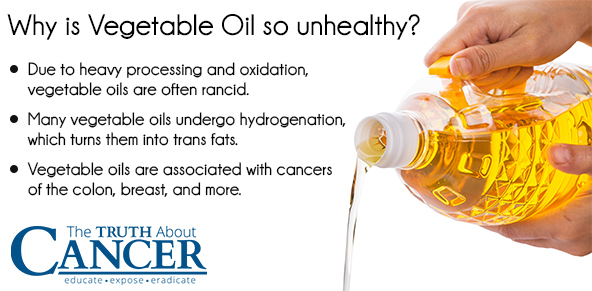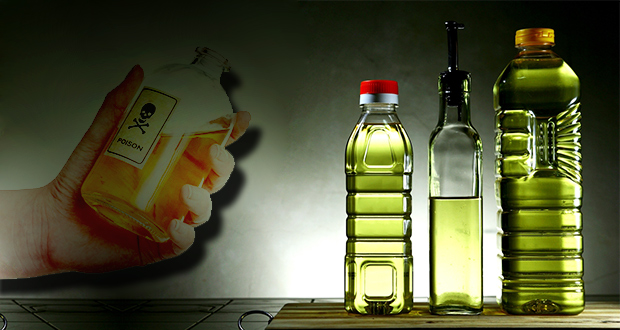In 1956, a major cooking oil company published a series of magazine advertisements claiming that “fried foods become light foods” when vegetable oil is used in place of butter or lard. The clear message to health-savvy homemakers was that vegetable oil was a low-calorie solution to the more traditional fats they were cooking with. Millions of well-meaning cooks took the bait and made the switch, thinking their families would be better off as a result.
Fast-forward 60 years and this cooking oil marketing blitz was evidently an industry success. Vegetable oils continue to remain the go-to fat used in fried and processed foods. Marketers are still claiming that they’re better for human health than animal fats because they contain no cholesterol and aren’t saturated. But what does the latest science have to say about this vegetable oil madness?
In a nutshell: all that “golden goodness” being dumped into deep fryers, drizzled on salads, and poured into frying pans isn’t exactly the health boon that industrial processors have long claimed it is. So-called “heart healthy” cooking oils (i.e. soy, canola (rapeseed), cottonseed, sunflower, and corn) just so happen to be among the leading causes of heart disease and cancer in America today. Most consumers have no idea that they’re being duped.
History of this Cooking Oil Exposes it as Toxic Waste
The chemical industry and popular media have long hyped vegetable oil as the “healthy” choice for dietary fat. This is primarily because it’s cheap to produce and generates sizeable revenues for the corporations that make it. The alleged health benefits of vegetable oil as a cooking oil are minimal at best. And after more than 100 years of use in the food supply we are now seeing the dire consequences of this deception − rampant chronic disease.
The origins of vegetable oil and how it came to be the standard fat used in American food preparation are disturbing, to say the least. According to the critically acclaimed book The Happiness Diet, it all began with global consumer product giant Procter & Gamble (P&G). P&G convinced the American public to abandon the use of animal fats in favor of its own industrially-processed vegetable oil.
When William Procter and James Gamble teamed up and began manufacturing soap from cottonseeds during their company’s infancy, they realized that this process generated a lot of waste in the form of cottonseed oil. This oil would eventually be peddled off as a “nutritious food,” though it has virtually no nutritional value at all. In its raw form it’s actually a toxin that some countries use as a form of male birth control.
A crafty array of marketing tactics combined with aggressive sample distribution eventually landed this cooking oil into millions of homes and restaurants throughout America. Though this feat took considerable time and effort, the transformation of this industrial waste from filth to food was a success, and the rest is history.
A piece published in Science Monthly succinctly sums up how cottonseed oil, and vegetable oils at large, went from noxious waste to common cooking oil:
What was garbage in 1860 was fertilizer in 1870, cattle feed in 1880, and table food and many things else in 1890.”
Vegetable Oil is Extremely Unhealthy, and Here’s Why
So what’s the big deal? If vegetable oil supposedly helps lower cholesterol and prevent artery hardening, does it really matter where it comes from or how it came to be standard fare in the American palate? Not so fast. Here are a few dirty facts about vegetable oil that you may not know:

1) Vegetable oils are often rancid due to heavy processing and oxidation.
A combination of high heat, pressure, and chemical solvents is used to extract vegetable oils from plants, exposing them to an incredible amount of air and light. When this occurs, these oils oxidize and become rancid, as well as lose many or all of their healing antioxidants. This renders them toxic and inflammatory.
2) Many vegetable oils undergo hydrogenation, which turns them into trans fats.
In order to create a desirable consistency and texture for use in baking and other forms of cooking, vegetable oils are often hydrogenated to make them “creamier” and solid at room temperature. Hydrogenated and partially-hydrogenated vegetable oils are essentially trans fats that interfere with the body’s normal metabolism of nutrients, leading to health conditions such as:
- Gastrointestinal disease
- Immune system damage
- Liver disorders
- Atherosclerosis
- Diabetes
- Obesity
- Cancer
The hydrogenation process might make vegetable oils last longer on the shelf, but consuming them has repeatedly been shown in the scientific literature to induce many forms of cancer. One study out of Vanderbilt University found that trans fat consumption is associated with an increased risk of death. Not only from heart disease but from all causes, meaning these oils are generally toxic to human health.
3) Vegetable oils are associated with cancers of the colon, breast, and more.
Researchers in Europe discovered several years back that trans fat intake can increase a woman’s risk of breast cancer nearly twofold. Similar case studies have demonstrated trans fat intake as a major risk factor for colon and other forms of cancer as well.
What Cooking Oils ARE Good for You?
So what’s the solution? Reverting back to the animal fats of old is a surefire way to avoid the pitfalls of vegetable oil consumption. If you don’t consume animal products, be sure to use healthy saturated fats such as palm and coconut oil. Contrary to popular belief, saturated fats aren’t responsible for clogging your arteries and promoting heart disease − vegetable oils are!
“Unsaturated fat makes up 74% of the fat that is found in clogged arteries, and more than half of that is polyunsaturated fat,” explains Dr. Josh Axe, a leading expert in progressive health and nutrition.
The best oils you can use for cooking, as extensively corroborated by the renowned Weston A. Price Foundation, include:
- Butter (preferably grass-fed butter that is darker yellow in color)
- Tallow and suet from both beef and lamb (pastured with no hormones or antibiotics)
- Lard from pigs (pastured with no hormones or antibiotics)
- Chicken, goose, and duck fat (pastured with no hormones or antibiotics)
- Coconut oil
- Avocado oil






















The best cooking oil used in India for over 2000 years is Mustard oil, also recommended by Ayurveda.
I just now wanted to thank you once again for your amazing web site you have made here.
It truly is full of ideas for those who are actually interested
in that subject, especially this very post. Your
all so sweet as well as thoughtful of others
as well as reading your blog posts is a wonderful
delight to me. And what generous gift! Dan and I are going to have fun making use of your suggestions in what we should do
in a month’s time. Our checklist is a mile long which
means your tips will definitely be put to great use.
We’re glad to have been helpful to you!
Wishing you and Dan many blessings! ❤️
With so many other oils to cook with, it’s not hard to switch. Great info, thanks.
Thanks for the information, visit to get knowledge of Essential and Carrier Oils
I use coconut oil sometimes in cooking, but it is in solid form. Therefore, I have to take out of the fridge and leave it at room temperature to soften.
Thanks for the amazing information.
You can also use olive oil for cooking as it contains less fat. It decreases the chances of heart attack. It is a good oil for gaining healthy weight.
We are big fans of the health benefits of olive oil! Thank you for your comment, Samuel.
Yes, cooking oils are somewhat harmful for our health. I hope people will switch to organic things like essential oils or carrier oils soon. Especially, Olive oil.
You recommend palm oil? I read everywhere that it is one of the worst oils to eat! 🙁
Hello Elena, Palm oil is packed with rich phytonutrients and antioxidants and a very healthy cooking oil. It’s been shown to help reduce blood pressure, improve circulation, and normalize cholesterol levels. It’s very shelf-stable and needs no hydrogenation to preserve it due to its many components that have superior oxidative stability. Palm oil is also an ideal oil for making MCT (medium chain triglycerides) oil, one of the most bioavailable sources of energy. Similar to coconut oil, it can be nearly immediately converted to energy due to the removal of long-chain fatty acids that take longer to digest. Thank you for reaching out.
Thanks for sharing this information. I think it will help me a lot. I hope people will switch to organic things like essential oils or carrier oils soon. Thanks a ton.
We hope so too, Megha. Thank you for being with us.
Thanks for sharing useful information.
Thanks for sharing excellent information on this topic.
Good article, Keep it up!
Thank you for the information. even we are into manufacturing segment. do kindly visit our website for more products and services
“Wow, I had no idea about the risks! Thanks for the heads-up. Time to rethink my cooking oil choices.”